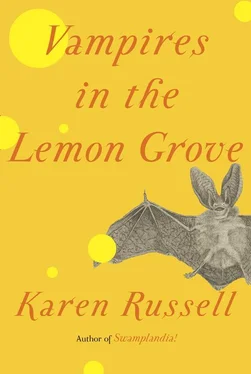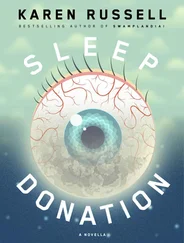“What is she making?”
“What are you making?”
“What are you going to do with all that, Kitsune?” Tooka asks nervously.
“Oh, who knows? I’ll just see what it comes to.”
But I do know. Without my giving a thought to what step comes next, my hands begin to fly.
The weaving comes so naturally to me that I am barely aware I am doing it, humming as if in a dream. But this weaving is instinctual. What takes effort, what requires a special kind of concentration, is generating the right density of the thread. To do so, I have to keep forging my father’s name in my mind, climbing those stairs, watching my mistake unfurl. I have to drink the toxic tea and feel it burn my throat, lie flat on the cot while my organs are remade by the Agent for the factory, thinking only, Yes, I chose this . When these memories send the fierce regret spiraling through me, I focus on my heartbeat, my throbbing palms. Fibers stiffen inside my fingers. Grow strong, I direct the thread. Go black. Lengthen. Stick. And then, when I return to the vats, what I’ve produced is exactly the necessary denier and darkness. I sit at the workbench, at my ordinary station. And I am so happy to discover that I can do all this myself: the silk-generation, the separation, the dyeing, the reeling. Out of the same intuition, I discover that I know how to alter the Machine. “Help me, Tsuki,” I say, because I want her to watch what I am doing. I begin to explain, but she is already disassembling my reeler. “I know, Kitsune,” she says, “I see what you have in mind.” Words seem to be unnecessary now between me and Tsuki — we beam thoughts soundlessly across the room. Perhaps speech will be the next superfluity in Nowhere Mill. Another step we kaiko -girls can skip.
Together we adjust the feeder gears, so that the black thread travels in a loop; after getting wrung out and doubled on the Machine’s great wheel, it shuttles back to my hands. I add fresh fibers, drape the long skein over my knees. It is going to be as tall as a man, six feet at least.
Many girls continue feeding the Machine as if nothing unusual is happening. Others, like Tsuki, are watching to see what my fingers are doing. For the past several months, every time I’ve reminisced about the Agent coming to Gifu, bile has risen in my throat. It seems to be composed of every bitterness: grief and rage, the acid regrets. But then, in the middle of my weaving, obeying a queer impulse, I spit some onto my hand. This bile glues my fingers to my fur. Another of nature’s wonders. So even the nausea of regret can be converted to use. I grin to Dai in my head. With this dill-colored glue, I am at last able to rub a sealant over my new thread and complete my work.
It takes me ten hours to spin the black cocoon.
The first girls who see it take one look and run back to the tatami.
The second girls are cautiously admiring.
Hoshi waddles over with her bellyful of blue silk and screams.
I am halfway up the southern wall of Nowhere Mill before I realize what I am doing; then I’m parallel to the woodpecker’s window. The gluey thread collected on my palms sticks me to the glass. For the first time I can see outside: from this angle, nothing but clouds and sky, a blue eternity. We will have wings soon , I think, and ten feet below me I hear Tsuki laugh out loud. Using my thread and the homemade glue, I attach the cocoon to a wooden beam; soon, I am floating in circles over the Machine, suspended by my own line. “Come down!” Hoshi yells, but she’s the only one. I secure the cocoon and then I let myself fall, all my weight supported by one thread. Now the cocoon sways over the Machine, a furled black flag, creaking slightly. I think of my grandfather hanging by the thick rope from our barn door.
More black thread spasms down my arms.
“Kitsune, please. You’ll make the Agent angry! You shouldn’t waste your silk that way — pretty soon they’ll stop bringing you the leaves! Don’t forget the trade, it’s silk for leaves, Kitsune. What happens when he stops feeding us?”
But in the end I convince all of the workers to join me. Instinct obviates the need for a lesson — swiftly the others discover that they, too, can change their thread from within, drawing strength from the colors and seasons of their memories. Before we can begin to weave our cocoons, however, we first agree to work night and day to reel the ordinary silk, doubling our production, stockpiling the surplus skeins. Then we seize control of the machinery of Nowhere Mill. We spend the next six days dismantling and reassembling the Machine, using its gears and reels to speed the production of our own shimmering cocoons. Each dusk, we continue to deliver the regular number of skeins to the zookeeper, to avoid arousing the Agent’s suspicions. When we are ready for the next stage of our revolution, only then will we invite him to tour our factory floor.
Silkworm moths develop long ivory wings, says Chiyo, bronzed with ancient designs. Do they have antennae, mouths? I ask her. Can they see? Who knows what the world will look like to us if our strike succeeds? I believe we will emerge from it entirely new creatures. In truth there is no model for what will happen to us next. We’ll have to wait and learn what we’ve become when we get out.

The old blind woman really is blind, we decide. She squints directly at the wrecked and rerouted Machine and waits with her arms extended for one of us to deposit the skeins. Instead, Hoshi pushes a letter through the grate.
“We don’t have any silk today.”
“Bring this to the Agent.”
“Go. Tell. Him.”
As usual, the old woman says nothing. The mulberry sacks sit on the wagon. After a moment she claps to show us that her hands are empty, kicks the wagon away. Signals: no silk, no food. Her face is slack. On our side of the grate, I hear girls smacking their jaws, swallowing saliva. Fresh forest smells rise off the sacks. But we won’t beg, will we? We won’t turn back. Dai lived without food for five days. Our faces press against the grate. Several of our longest whiskers tickle the zookeeper’s withered cheeks; at last, a dark cloud passes over her face. She barks with surprise, swats the air. Her wrinkles tighten into a grimace of fear. She backs away from our voices, her fist closed around our invitation to the Agent.
“NO SILK,” repeats Tsaiko slowly.

The Agent comes the very next night.
“Hello?”
He raps at our grated door with a stick, but he remains in the threshold. For a moment I am sure that he won’t come in.
“They’re gone, they’re gone,” I wail, rocking.
“What!”
The grate slides open and he steps onto the factory floor, into our shadows.
“Yes, they’ve all escaped, every one of them, all your kaiko-joko— ”
Now my sisters drop down on their threads. They fall from the ceiling on whistling lines of silk, swinging into the light, and I feel as though I am dreaming — it is a dreamlike repetition of our initiation, when the Agent dropped the infecting kaiko into the orange tea. Watching his eyes widen and his mouth stretch into a scream, I too am shocked. We have no mirrors here in Nowhere Mill, and I’ve spent the past few months convinced that we were still identifiable as girls, women — no beauty queens, certainly, shaggy and white and misshapen, but at least half human; it’s only now, watching the Agent’s reaction, that I realize what we’ve become in his absence. I see us as he must: white faces, with sunken noses that look partially erased. Eyes insect-huge. Spines and elbows incubating lace for wings. My muscles tense, and then I am airborne, launching myself onto the Agent’s back — for a second I get a thrilling sense of what true flight will feel like, once we complete our transformation. I alight on his shoulders and hook my legs around him. The Agent grunts beneath my weight, staggers forward.
Читать дальше













